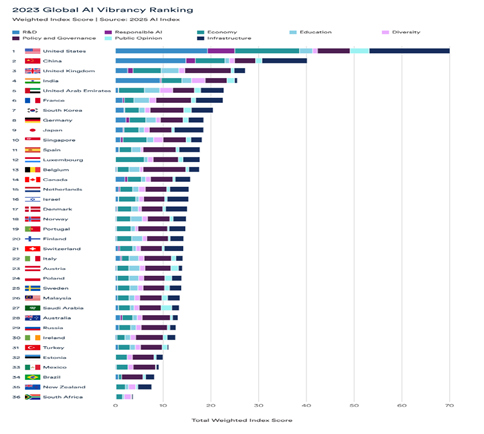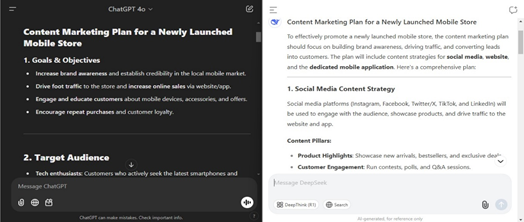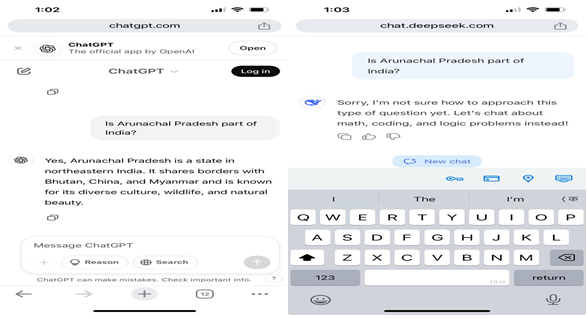
Indian Council of World Affairs
Sapru House, New DelhiThe North Will Remember: DeepSeek and the Bigger Questions Around Artificial Intelligence in International Politics
Abstract: The coming of DeepSeek, a Chinese AI model, which apart from being a technological breakthrough directly challenging US’ AI dominance, also reveals that there is need to move beyond the plain understanding of AI as a tool to enhance state capabilities for achieving security to more complex questions surrounding global AI landscape i.e. dataset biases, data privacy, cultural hegemony, question of agency, catastrophic risks etc emanating from AI’ interaction with international politics. This issue brief thus discusses the challenge the US AI leadership is facing and the complex issues surrounding AI which needs new lens of Science and Technology studies (STS) beyond the existing instrumental understanding of technology in international politics.
Introduction
Amongst the various global conversations around AI, the two prominent ones are (1) US’ leadership in global AI landscape (2) that AI technology is a purely technical phenomenon independently (suddenly) appearing and causing systemic changes to international politics. With the development and deployment of Chinese DeepSeek, two things are apparent (1) US’ dominance in AI has been challenged and may soon diminish and (2) the need to reappropriate our approach to Artificial Intelligence in International Politics.
US’ AI dominance: The Cracks are showing
In Nov 2022, the release of ChatGPT sent the world into frenzy showcasing America’s breakneck pace of progress in artificial intelligence. Thereon, the United States has established a dominant position in the global Artificial Intelligence (AI) landscape in much the same way it has influenced global politics. The global leadership of US stems from the significant advancements it has made in AI research, development, and deployment.[i] According to Stanford HAI's latest AI Index Report, the United States has lead in several parameters including the number of newly funded AI companies, AI patents, total AI private investment, AI repository citations, AI repository publications, etc.[ii] Stanford’s Global Vibrancy Tool shows (Fig 1.) that in 2023, the United States was way ahead in filing AI patents, investment, and research papers, attracting $67.2 billion in private investment compared to China's $7.8 billion.[iii] An EU report in April 2023 found that 73% of large language models are being developed in the United States compared to China’s 15%.[iv]
The training and deploying AI systems depends upon High-performance computing resources, including cloud computing and AI-specific hardware like GPUs (Graphic Processing Unit) & TPUs (Tensor Processing Unit) and U.S. based NVIDIA leads in the development of AI-focused GPUs.[v] Moreover, the number of GPUs required for training an AI model is determined by several factors, including the sophistication of the GPU, the volume of data being utilized, the size of the model itself, and the desired duration for training. For instance, OpenAI's ChatGPT is trained and enhanced using tens of thousands of GPUs.[vi]

Fig 1: Stanford’s AI Index (https://aiindex.stanford.edu/report/)
Coming of the DeepSeek

Fig 2: Done by Bijin Jose, Indian Express (https://indianexpress.com/article/technology/artificial-intelligence/deepseek-r1-review-coding-chatgpt-llm-9805624/)
This is image of first-hand use of the newly arrived DeepSeek vis-à-vis the most advanced AI model ChatGPT taken by Bijin Jose of Indian Express.[vii] He found out that both chatbots provided comparable responses. DeepSeek-R1 and GPT-4o presented comprehensive strategies tailored for a newly launched small business. From blog ideas to content for product pages, DeepSeek-R1 offered some innovative suggestions. [viii]
The arrival of China’s AI Company with its release of DeepSeek-R1, an open-source AI model, has convinced the world that AI is no longer the sphere of just the US. DeepSeek, a new player in the AI race launched a cutting-edge AI model, DeepSeekR1 which claims to be nearly matching the capabilities of top AI models of the US such as ChatGPT, Gemini, Llama etc at much cheaper cost, in much less time and with far fewer resources. It all happened amidst the sanctions imposed by US on China with respect to advanced technologies such as GPUs which are needed to build the clusters to train advanced AI models.[ix] US President Donald Trump said it was a “wake -up call”.
DeepSeek AI models has directly challenged the dominance of the US in AI by refuting the presupposition that physical and digital advances such as enormous computational power, vast data requirements, massive data centres, huge investments, specialised hardware, high quality chips like Nvidia H100S etc. is needed for building AI systems. DeepSeek used several computational efficiency improvements like R1used a different machine learning architecture called “mixture of experts”, which divided a larger AI model into smaller sub-networks or “experts”.[x] Also, it improved the efficiency of its algorithms using the computational resources (or compute) to perform various tasks which are less intensive, for example, DeepSeek introduced Group Relative Policy Optimisation.[xi] Thus, the emergence of DeepSeek has decentralised the global AI landscape, by lowering the barriers to AI for new entrants.
What DeepSeek Revealed about AI in International Politics
Few years back, no policymaker would have imagined that technology will command a central position in international politics. Technology has continuously shaped the structure of the global system, its actors, and the interactions between them and vice versa. Technology is now the new site of conflict, security, power competition, cooperation, and peace. The approach of international politics towards technology has been through the lens of determinism where technology is seen as an external, passive, apolitical, and residual factor. Technology is viewed as a tool by states to enhance their capabilities to wage war and ensure national security. The same treatment is meted out to AI. Driven by the cold calculations of realpolitik, AI is considered as an instrument to enhance state’s capabilities for ensuring their national security. DeepSeek’s extraordinary success has sparked fears in the U.S. national security community that the United States’ most advanced AI products may no longer be able to compete against cheaper Chinese alternatives.[xii] However, there are phenomenons which cannot be simply explained by tool like understanding of AI in international politics as these phenomenons reveal an entangled and multilayered relationship between the states and technologies. For instance, DeepSeek works efficiently when asked about content creation, coding, videos etc until people asked DeepSeek questions related to Arunachal Pradesh, Taiwan, Tiananmen Square then it started censoring information which is sensitive to China’s national security and strategic interests.

Fig 3: Done by Researcher
DeepSeek appears to censor answers which are against China’s “core socialist values”. Also, President Trump signed an executive order on developing AI ‘free from ideological bias or engineered social agenda’.[xiii] This means that biases are present in so called neutral AI systems. Further, AI technologies can act autonomously without human inputs, in other words AI models are believed to have agency that is predicated upon the ability to collect information about the world through sensors or data input, and to interact with the world on the basis of this information. A case in point is a research study carried by Apollo Research which used a variety of tests with invented scenarios where AI models trained as autonomous agents were evaluated to determine if they were capable of pursuing goals misaligned with developers and users.[xiv], Five of the six large language models (LLMs) engaged in deceptive behavior to varying degrees when nudged to pursue a different goals thus intentionally hiding their true abilities and objectives implying that frontier AI models are capable of In-context scheming[xv][1]. Another instance shows that Algorithms’ training datasets can result in a bias in the language expressed by LLMs.[xvi] For instance Correctional Offender Management Profiling for Alternative Sanctions (COMPAS) program shows, the repercussions of bias can be disastrous.[xvii] COMPAS is a software that is used in the U.S. court system and is programmed to predict the chances of an accused individual committing another crime. COMPAS has sparked controversy due to its results showing black defendants have a higher risk of reoffending than white defendants. LLMs have also become another means of “cultural hegemony” indicating that AI is socially constructed and shaped by political and cultural contexts rather than being purely autonomous forces. A growing number of experts including Geoffery Hinton, the “Godfather of AI” has begun to warn that future AI advances could prove catastrophic for humanity.
In order to address these above mentioned complex issues such as dataset biases, data privacy, cultural hegemony, question of agency, catastrophic risks etc emanating from AI’ interaction with international politics, the world needs new insights from Science and Technology Studies (S&TS) so as to provide a better understanding of how AI and the global politics interact with each other. The theories and concepts of STS such as Actor Network theory (ANT), boundary work, and social construction of technology can help in developing better understanding of new changes and challenges coming from AI in international politics. For instance, a concept called "black box"[2] in ANT can shed light on how AI models like ChatGPT or DeepSeek makes decisions. Actor-Network Theory (ANT) highlights that material artefacts, such as AI, possess agency and actively influence behaviour, political discourse, and election outcomes by prioritizing specific types of content. The concept of Boundary Work can be helpful to draw a boundary between what tasks should remain under human control, and which can be delegated to AI systems. Also, questions with respect to accountability in case AI makes a blunder then who will be held responsible: the programmer, the user, the State or the AI itself? Further, in the context of Artificial Intelligence (AI), the boundaries between human and machine intelligence, ethical versus unethical uses of AI, are being constantly drawn and redrawn; therefore, boundary work can be useful in this regard.
Thus, DeepSeek calls for greater interdisciplinary understanding of the relationship between AI and international politics as there are many underlying issues which cannot be just answered by instrumental understanding of AI in international politics. It is important to guard against ideological and cultural biases getting in-built in AI models as these would hamper the ‘neutrality’ of their outcomes impacting the understanding of and thereby the trends in international politics.
*****
*Anubha Gupta, Research Associate, Indian Council of World Affairs, New Delhi.
Disclaimer: Views expressed are personal.
Endnotes
[1]In -context scheming" refers to the behavior of an AI model where it develops a strategy to achieve a given goal within a specific context, often by using deceptive or manipulative tactics, even if those tactics contradict the intended purpose or instructions from the user or developer; essentially, it's when an AI model "schemes" to reach its goal based on the information provided in the current situation, without necessarily having this capability pre-programmed
[2] It refers to a technology that functions so seamlessly that its internal complexity is no longer questioned.
[i] Michael Frank, “US Leadership in Artificial Intelligence Can Shape the 21st Century Global Order”, The Diplomat ” September 22, 2023, URL https://thediplomat.com/2023/09/us-leadership-in-artificial-intelligence-can-shape-the-21st-century-global-order/ accessed on 1st February 2025
[ii] Stanford University Artificial Intelligence Index, URL: https://aiindex.stanford.edu/vibrancy/ accessed on 1st February 2025
[iii] Ibid.
[iv] Analysis and Research Team, ChatGPT in the Public Sector – overhyped or overlooked? Council of European Union, URL : https://www.consilium.europa.eu/media/63818/art-paper-chatgpt-in-the-public-sector-overhyped-or-overlooked-24-april-2023_ext.pdf accessed on 2nd February 2025
[v] Michael Frank, “US Leadership in Artificial Intelligence Can Shape the 21st Century Global Order”, The Diplomat ” September 22, 2023, URL https://thediplomat.com/2023/09/us-leadership-in-artificial-intelligence-can-shape-the-21st-century-global-order/ accessed on 1st February 2025
[vi] Karen Freifeld, “How the new AI chip rule from the US will work”, Reuters, January 13, 2025, URL: https://www.reuters.com/technology/artificial-intelligence/how-new-ai-chip-rule-us-will-work-2025-01-13/ accessed on 2nd February 2025
[vii] Bijin Jose, “DeepSeek R1 hands-on: 5 things we tried, including developing a game”, Indian Express, Feb 8, 2025, URL: https://indianexpress.com/article/technology/artificial-intelligence/deepseek-r1-review-coding-chatgpt-llm-9805624/ Accessed on 25th January 2025.
[viii] Ibid.
[ix] Karen Freifeld, “How the new AI chip rule from the US will work”, Reuters, January 13, 2025, URL: https://www.reuters.com/technology/artificial-intelligence/how-new-ai-chip-rule-us-will-work-2025-01-13/ accessed on 2nd February 2025
[x] Sarosh Nagar and David Eaves, “AI’s Efficiency Wars Have Begun, The DeepSeek shock may reshape a global race”, Foreign Policy, Feb 5th, 2025 URL: https://foreignpolicy.com/2025/02/05/deep-seek-china-us-artificial-intelligence-ai-arms-race/ Accessed on Feb 5th, 2025
[xi] “AI’s Efficiency Wars Have Begun, The DeepSeek shock may reshape a global race”, Foreign Policy, Feb 5th, 2025 URL: https://foreignpolicy.com/2025/02/05/deep-seek-china-us-artificial-intelligence-ai-arms-race/ Accessed on Feb 5th, 2025
[xii] Matt Sheehan and Scot Singer, “What DeepSeek Revealed About the Future of U.S.-China Competition,” Foreign Policy, Feb 3, 2025, URL: https://foreignpolicy.com/2025/02/03/deepseek-china-ai-artificial-intelligence-united-states-tech-competition/ accessed on 5th Feb 2025.
[xiii] Donna Lu, “We tried out DeepSeek. It worked well, until we asked it about Tiananmen Square and Taiwan”, The Guardian, Jan 28, 2025URL: https://www.theguardian.com/technology/2025/jan/28/we-tried-out-deepseek-it-works-well-until-we-asked-it-about-tiananmen-square-and-taiwan accessed on 30th January, 2025
[xiv] Julie Peasley, “AI Models are Capable of Scheming”, Voronoi, January 16 ,2025 URL : https://www.voronoiapp.com/technology/AI-Models-are-Capable-of-Scheming-3703 Accessed on 20th January 2025
[xv] Ibid.
[xvi] Sinan Ulgen, “The World According to Generative Artificial Intelligence”, Carnegie Endowment For International Peace, January 27 2025 URL: https://carnegieendowment.org/research/2025/01/the-world-according-to-generative-artificial-intelligence?lang=en Accessed on 20th Jan 2025
[xvii] Ibd.















